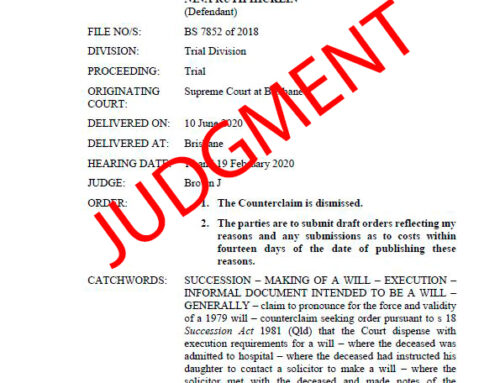Whilst many people opt for individual trustees, particularly for their Self Managed Superannuation Fund (SMSF) and their family discretionary trust, there is a potential for individual liability for the unsuspecting individual trustee.
Being an individual trustee makes you responsible for the actions of your fellow trustee and liable for any liabilities including tax even if that liability is incurred without your knowledge.
The Australian Taxation Office (ATO) recently obtained judgement against an individual trustee[1] who was one of two individual trustees of a SMSF. One of the trustees
misappropriated funds without the knowledge of the other trustee and then absconded, presumably to a non-extradition country. The result was that the trustee who could be located was liable for a very significant tax bill and had no resources to fund that liability.
“This situation would not have been as dire had a company been trustee.”
As a result of the actions of the trustee the ATO declared the SMSF as non-compliant, the result of which was that the Fund incurred a tax liability of $1,583,873.68 with additional penalties of $1,475,322.50. It is important to note that there was no dispute that the remaining trustee had no knowledge of and did not consent to the actions of the trustee who absconded.
The remaining trustee argued that the Fund should not be made non-compliant because of the significant of the tax consequence that would result and the Tribunal found that although it was not difficult to feel some sympathy for the position in which the remaining trustee found herself the tax assessment and penalties should be upheld for policy reasons. This situation would not have been as dire had a company been trustee. As an individual the remaining trustee was personally responsible for the Fund’s tax liability even though the liability arose from events of which she had no knowledge or involvement. This would not be the case if the trustee was a corporate entity.
“…the succession of the Family Trust and the Self Managed Super Fund is best managed via a corporate trustee.”
The abovementioned illustration is not an isolated case. A similar issue arose[2] where a trustee and member who happened to be a drug addict son withdrew almost all of the money in the SMSF. The Administrative Appeals Tribunal, expressed sympathy for
the other trustees of the SMSF, yet it upheld a Notice of Non-Compliance the effect of which was that the other trustees remained individually liable for the tax assessment with no resources from which to pay that tax assessment. Presumably they were required to declare themselves bankrupt.
From an estate planning point of view the succession of the Family Trust and the Self Managed Superannuation Fund is best managed via a corporate trustee. When the risks of individual trustees are considered against the cost of having a corporate trustee and the convenience from
an estate planning perspective is factored the cost of the alteration should be viewed as an insurance policy that is paid once and represents money well spent.
Why not make an appointment to review your SMSF or Family Trust Trustees and/or your estate planning by calling 1800 000 993 of emailing info@cookehutchinson.com.au
Daniel Hutchinson
Legal Practice Director – TEP; LLB (QUT); BBus (QUT)
Disclaimer
The information contained in this report is merely a guide and is not meant to be a detailed explanation of the law relating to this subject. We recommend that you see us about any particular legal problem.
[1] Shail Superannuation Fund –v- Commissioner of Taxation [2011] AATA 940
[2] See Triway Superannuation Fund –v- Commissioner of Taxation [2011] AATA 302





